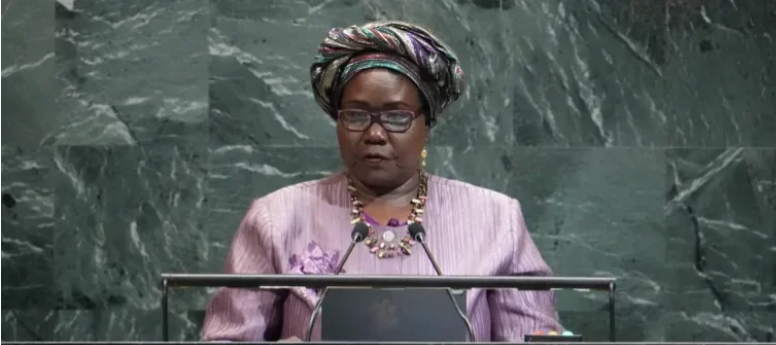South Sudan’s Vice President Josephine Lagu told the U.N. General Assembly on Thursday that the country’s fragile 2018 peace agreement remains on track despite significant delays and a major political crisis that led to the detention of the opposition leader and first vice president, Riek Machar.
Lagu, who represents the South Sudan Opposition Alliance (SSOA) in the power-sharing transitional government, acknowledged the implementation of the peace deal has been “slower than we would have wanted.” However, she asserted that the agreement has “held for seven years,” bringing relative peace and allowing for the return of many refugees.
“The implementation of the peace agreement is about 60% executed,” Lagu said in her speech. “The government has renewed its political will and is accelerating key benchmarks.”
The speech at the 80th session of the UN General Assembly presented an optimistic government view of a peace deal that is showing severe strains. The Revitalized Agreement on the Resolution of the Conflict in South Sudan ended a five-year civil war that killed nearly 400,000 people. It established a transitional government leading to national elections, now scheduled for December 2026.
Yet critical tasks—such as unifying armed forces and drafting a permanent constitution—remain unfinished. The nation’s stability was further jeopardized recently when First Vice President Riek Machar, a main signatory to the peace deal and the president’s longtime rival, was arrested and taken to a special court.
Machar is facing charges of treason, murder and crimes against humanity for his alleged role in a March attack by a militia group on an army base that officials say killed more than 250 soldiers. His supporters call the charges a politically motivated witch hunt.
Lagu addressed the incident directly, insisting Machar’s arrest “was not politically motivated” but had “endangered the peace process.” She said the matter was being handled legally with assurances of a fair trial.
Despite these challenges, Lagu outlined progress, including the training and partial deployment of unified security forces and the establishment of electoral institutions. With the December 2026 election deadline approaching, she appealed for international support and for the lifting of arms embargoes and individual sanctions on South Sudan.
“The transitional period must end with the conduct of general elections,” Lagu said, noting this would allow South Sudanese “to democratically elect their leaders for the first time.”
The vice president also disclosed that the government in Juba is considering resumption of the Tumaini Initiative peace talks with holdout opposition groups, which the government recently declared dead, urging regional and other partners to consider facilitating the process.
The Kenyan-led peace talks were adjourned indefinitely on Feb. 7, 2025, without resolution.
Last month, President Salva Kiir’s senior advisor and head of the government negotiating team to the Tumaini talks, Gen. Kuol Manyang Juuk, declared the Tumaini Peace Initiative defunct, saying it had deviated from its original mandate and attempted to override the 2018 Revitalised Agreement on the Resolution of the Conflict in South Sudan (R-ARCSS).
The Tumaini Initiative, launched in Nairobi in May 2024, aimed to integrate holdout groups that did not sign the 2018 peace deal. These include the Real-SPLM led by Pagan Amum, the South Sudan United Front led by former army chief Paul Malong Awan, the South Sudan People’s Movement/Army (SSPM/A) led by Gen. Stephen Buay Rolnyang, and the NAS-RCC led by Gen. Mario Laku Thomas.
It remains unclear whether the government wants to relocate the talks from Kenya, which served as the main facilitator.
Beyond the peace process in the world’s youngest nation, Vice President Lagu detailed a range of national challenges and priorities.
She highlighted the severe impact of climate change on South Sudan, describing recurrent floods and prolonged droughts that cause crop failure and mass displacement. She called for “equitable and predictable climate financing” to support the country’s adaptation efforts, including a plan to plant 100 million trees by 2030.
On development, Lagu pointed to progress in agriculture, health, and education. She said primary school enrollment has surged from 300,000 to 2.1 million children, with gender parity nearly achieved at that level. However, she noted that 2.8 million children remain out of school.
The vice president, who represented the president at the UN general assembly for the first time, also emphasized the government’s focus on women’s empowerment, citing a constitutional mandate for 30% female representation in government, which she said has been exceeded at the presidential level.
Lagu appealed for debt cancellation and reforms to international financial institutions to give developing nations a greater voice. She also expressed support for expanding the U.N. Security Council to include permanent African representation.
Lagu was appointed one of the country’s five vice presidents in February. She previously served as minister of agriculture.




